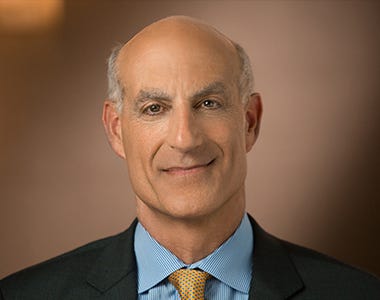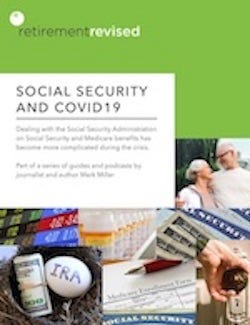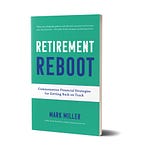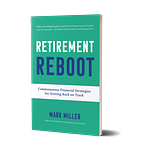
This week, the podcast takes a look at what to do with a 401(k) account left behind with a former employer - should you leave it there, or roll it over to an Individual Retirement Account (IRA)?
I wrote about this topic last weekend for The New York Times - the context being the stunning job losses the country is experiencing now due to the coronavirus crisis.
People stuck in this situation will be looking for emergency lifelines to meet living expenses. And retirement accounts will be a tempting option, as the emergency CARES Act passed in March provides flexible hardship withdrawal options for 401(k) and individual retirement accounts.
For jobless workers who don’t need to tap retirement accounts right now, the choice is to leave the money where it is, or roll it over to an IRA. This is an important decision whenever you leave a job.
Joining me on the podcast this week to talk about IRA rollovers is Scott Puritz. Scott is the managing director of Rebalance, an investment firm that helps clients manage retirement assets. Rebalance argues that rollovers usually are the best move - and especially so when you’re shifting out of a high cost 401k plans into an IRA invested in very low cost passive mutual funds.
Listen to the podcast by clicking the player icon at the top of the page. The podcast also can be found on Apple Podcasts, Spotify and Stitcher.
Not a subscriber yet? Take advantage of a special offer

Sign up now for the free or subscriber edition of the newsletter, and I’ll email a copy of my latest retirement guide to you. This one looks at dealing with the Social Security Administration during the COVID19 crisis.
Customer service at the Social Security Administration has changed during the coronavirus crisis - the agency closed its network of more than 1,200 field offices to the public in March.
Just a reminder- subscribers, have access to the entire series of guides at any time. Click on the little green button to subscribe, or go here to learn more.
House Democrats propose multi-employer pension rescue
House Democrats will take another run at rescuing multi-employer pension plans in the next round of coronavirus relief.
Roughly 10.6 million workers and retirees are relying on pensions from multi-employer plans, which are created under collective bargaining agreements and jointly funded by groups of employers in industries like construction, trucking, mining, and food retailing. There are about 1,400 multiemployer pension plans today.
Before the virus crisis, multiemployer plans covering 1.3 million workers and retirees were considered badly underfunded. Lawmakers have considered a variety of fixes, but had not reached agreement.
The $3 trillion House coronavirus relief bill, coming up for a vote by the end of this week, would require the federal government to set up a fund to rescue financially troubled multiemployer plans. Stay tuned.
Elsewhere, public pension plans had the worst first quarter on record due to the stock market’s volatility.
How Medicare’s new telehealth reimbursement is working

For years, advocates and researchers have urged greater use of telemedicine — delivered by video or phone, through online patient portals or remote monitoring devices — particularly for older adults. But Medicare has been slow to adapt, keeping tight barriers in place that prevented reimbursement to healthcare providers in most cases.
The barriers have come down during the coronavirus pandemic - Medicare is now providing full reimbursement for video and phone visits. Paula Span reports on how that is going in The New Old Age:
Still, by mid-April more than 20 percent of people over 70 had experienced a telehealth appointment since the start of the pandemic, a nationwide survey by NORC at the University of Chicago found. Almost half said they found the experience equivalent to an in-person visit; about 40 percent said it was worse.
In interviews, patients told me of similarly mixed reactions.
Learn more in Paula’s column for The New York Times.
Born in 1960? Your Social Security benefit could be lower

An odd coronavirus-related technical problem threatens a sizeable cut in Social Security benefits for people born in 1960. The issue stems from the way Social Security calculates a worker’s career earnings - a calculation that is critical to determining benefit levels. If the problem isn’t addressed - and I think it will be - these workers could see a permanent reduction in Social Security retirement benefits of around 13.8 percent, according to a research paper by Andrew Biggs, a resident scholar at the American Enterprise Institute and a former deputy commissioner of the Social Security Administration during the George W. Bush administration.
The issue here is falling national average wages this year due to the coronavirus recession. Before averaging past earnings, Social Security indexes your earnings to the growth of national average wages up to the year in which you turn 60. Nominal earnings in any past year are multiplied by the ratio of the national average wage in the year the worker turns 60 to the national average wage in the year the earnings took place. Right now, that is the 1960 birth cohort.
A decline in national average wages in that year reduces Social Security’s indexed measure of all your past earnings - and that leads to the lower Social Security benefit.
Biggs suggests fixing the problem by shifting the entire Social Security system from wage indexing to a formula that calculates benefits as a percentage of inflation-adjusted career-average earnings. Biggs and other conservative policy folks have been arguing for that change for quite a while. But the goal of any pension plan - including Social Security - is wage replacement. And generally, wage indexing produces stable replacement rates over time. Consumer price indexing would lead to declining replacement rates, e.g. benefit cuts.
Instead, Congress should simply add a hold harmless provision to the wage indexing provision. We already do that with the annual cost-of-living adjustment (something I’ll have more to say about soon, because the 2021 COLA is shaping up to be one of those weird years).
A hold-harmless clause for wage indexing would protect workers against the occasional black swan event, like the one we are experiencing now.
Learn more about this issue in Andrew’s paper, or an op-ed he penned on the topic this week for The Wall Street Journal.
Recommended reading this week
McDonald’s workers in Denmark pity us . . . The housing market faces its next crisis . . . How to earn a great risk-free return by paying down debt . . . Fearing covid-19, older people alter their living wills . . .Will COVID-19 make the decline narrative of aging worse . . . How I’m finding purpose in a pandemic.










